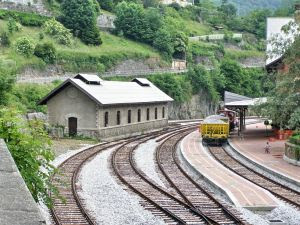
Backpacking is a term used to denote a form of low-cost independent international travel, differentiating it from other forms of tourism notably by the following typical attributes: minimal budget use, longer duration traveling, use of public transport and multiple destinations/countries. The origin of the name comes from the backpacks that budget travelers generally carry in the interests of mobility and flexibility.
Many commentators see backpacking as descriptive, not only of low-cost travel, but of the culture and philosophy often associated with it especially anti or trans-nationalism as well as a romanticization of wanderlust and a desire for "authentic" contact with local culture.
Low-cost options are popular: such as sharing lifts, budget flights, rail/bus passes (or if the backpacking trip is circumglobal, a relatively cheap round-the-world air ticket which permits numerous stops), youth hostels, free hospitality services and buying food at supermarkets and sometimes cooking for oneself in kitchen equipped hostels abroad instead of going to restaurants.
Hostels and other budget accommodations in the 'developed' world tend to be communal to some degree, and thus backpacker culture is often highly social and emphasizes the camaraderie of communal life, such as the lounge area common in many hostels. When backpackers stay in one place for a while, they often seek a house-share with numerous other backpackers and are likely to share a room to keep the costs down.
The common language of backpackers is overwhelmingly English in varying levels of fluency. This is due to the fact that English is the first language of most from Commonwealth of Nations countries plus USA and Ireland. Another major reason for the popularity of English is that it is the most common second language of most Western Europeans.
Backpacker culture is perhaps typified by the Lonely Planet (Australian) series of guidebooks, which caters to budget travelers both in its regular guides as well as, more specifically, the "On a Shoestring" regional compilations. The Rough Guide (UK) and Let's Go (USA) series of guidebooks are also popular. In France, the traditional backpacker's guidebook is the Guide du routard.
Traditionally, backpackers do not travel with expensive electronic equipment such as laptop computers and PDAs due to concerns about theft, damage, and additional luggage weight. However, the desire to stay connected coupled with trends in lightweight electronics have given rise to the flashpacking trend.
The majority of backpackers are in their late teens and 20s. Patrons at most youth hostels are over 18 (some even mandate a minimum age of 18) while guests over 30 are more rare. The 'stereotypical' backpacker is often envisioned as a college student or recent graduate in their mid-twenties with no dependents (spouse, children), or permanent employment at home, therefore making it easier to put typical daily responsibilities on temporary hiatus to go traveling for months at a time. Depending on the part of the world, the median age of backpackers can vary. Australia, Europe, and North America generally appeal to more youthful travelers, while more 'difficult' regions such as South America or the Middle East attract older and more experienced travelers.

Backpacker philosophy is sometimes criticized for being hypocritical. Some travelers have been known to forego finding "authentic" contact with a culture, and instead congregate only with other travelers in international hostels or guesthouses. Backpackers are accused of traveling to exotic places only to associate with other backpackers. Generally backpackers are from developed countries, speak very good or fluent English (even if from a non-English speaking country). When these backpackers arrive in developing countries they congregate at the hostels, guesthouses, bars in the center of town where they tend to not blend in.
Backpackers are sometimes blamed for the commercialization of the destinations they travel to. This can often lead to the overuse of certain natural and cultural resources or commercial exploitation of local people or the economy, a vice backpacking shares with other forms of tourism. A notable example of this phenomenon is Byron Bay in Australia, which was a largely quiet backpacker town in the 1970s and is now considered one of the most popular destinations in the 2000s with a bias for yuppies. This is sometimes said to actually pervert the backpacking culture itself: while backpackers seek genuineness and "authentic" cultural interactions, thus often looking for places with as few other foreigners as possible, they very often tend to meet in so-called "backpacker paradises" - places where all backpackers meet and that, eventually, end-up being modern-day "hippie-resorts". Examples include San Pedro de Atacama, a formerly isolated village in Chile and now a town dependent on tourism, and the island of Ko Pha Ngan in Thailand. This phenomenon is perhaps not unlike the phenomenon of gentrification that happens in urban ecologies.
A third layer of criticism is economic. Backpackers’ pursuit of “cheap” travel destinations is only possible through the imbalance of living costs between Western and developing nations. Thus, backpacking can be seen as an inherently exploitative activity that benefits from the poverty of destination countries. South East Asia and much of Latin America are notable examples of very inexpensive countries which backpackers visit and have the ability to stay comfortably for months even on a relatively small budget. A more recent example includes the collapse of the peso currency in Argentina in the early 2000s, which quickly made that country a very attractive destination for budget backpackers.
An additional criticism is a perception of language arrogance by many backpackers, particularly those from largely monolingual English-speaking countries such as Australia or the USA. While having a common language is a defining feature of backpacking, monolingual backpackers (who overwhelmingly speak English) are sometimes accused of being too arrogant with their use of English while abroad. A common citation is the assumption that youthful people and those working in the tourism industry in many countries around the world are now proficient in English or that English-speaking help will not be difficult to find, as opposed to learning and speaking the local language at even just a basic level out of self-interest or respect.
Finally, one more layer of criticism is the impact a heavy flow of backpackers can have on local cultures, especially in developping countries. The presence of large numbers of people who do not respect local customs can have effects that range from being a mild irritant to locals to being damageable to the local culture's long-term integrity. For example, a significant number of backpackers take their cues from each other and engage in behaviours that are not acceptable to their host country (such as dressing inappropriately, sunbathing topless or engaging in public displays of affection), despite the multiple warnings in guidebooks. Besides creating animosity against backpackers, this has led to some backpacking beach communities to become local attractions for young local men (such as many beaches in India). Also damaging is the heavy use of drugs, alcohol and tobacco made by some backpackers. For many, these habits are not representative of their habits at home. However, youth in the host country are constantly exposed to young, wealthy and arguably fashionable backpackers displaying these behaviours.[neutrality disputed] This can lead to heavy pressures to adopt similar behaviours.

No comments:
Post a Comment